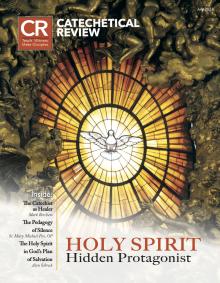Within the process of the Rite of Christian Initiation for Adults (RCIA), the Rite of Election is a powerful liturgical moment. The Church rejoices at the imminent birth of new Christians, praying for the Elect as they draw even closer to the Lord in preparation for receiving the Sacraments of Initiation. The rite is also a culmination of learning about the Church—it is the point when catechumens formally declare their desire to enter the Church. The Rite of Election can serve as a valuable opportunity for reflection for those of us who are parish catechetical leaders, reminding us too that communion must form the context for catechesis.
This intention of the Rite of Election is especially pronounced in the modified wording of the Rite of Election for children over the age of seven. In this version of the Rite of Election there is a profound moment when godparents are asked to formally declare the preparedness of the children through a series of questions: “Have these children shown themselves to be sincere in their desire for baptism, confirmation, and the Eucharist?” “Have they listened well to the word of God?” “Have they tried to live as his faithful followers?” “Have they taken part in this community’s life of prayer and service?”[1] While these questions are asked about the children, they have implications for the godparents and parents, and, by extension, us catechists as well. The questions point to the fact that becoming a disciple of Christ does not happen in a vacuum.
An Integral Part of Discipleship and Catechesis
The Directory for Catechesis, quoting Pope Francis, teaches that “The faith is professed, celebrated, expressed, and lived above all in community: ‘The communitarian dimension is not just a “frame,” an “outline,” but an integral part of the Christian life, of witness and of evangelization.’”[2] We see this implied in the questions asked in the Rite of Election. The first three questions could technically be discerned individually by the godparents alone but are more richly lived and discerned within the parish community. The fourth question necessarily includes the broader parish community. We as parish catechetical leaders have an incredible opportunity to pray for and foster this community within the programs we lead.
Practically speaking, parish catechetical leaders are often the first real contact a family seeking the sacraments through RCIA has with the parish community. We can guide this family into the community in not merely a superficial way but one that allows for friendship and apprenticeship in the Christian life. We become the gatekeepers in some sense, with a duty to bring those coming to the Church into the community of the parish. And, may I argue, we also have the mission to, under the guidance of the pastor, foster and encourage deep Christian community for all. The connections we facilitate can potentially allow catechumens to receive from and enrich a community for generations.
The rest of this online article is available for current Guild members.
This article is from The Catechetical Review (Online Edition ISSN 2379-6324) and may be copied for catechetical purposes only. It may not be reprinted in another published work without the permission of The Catechetical Review by contacting [email protected]

















